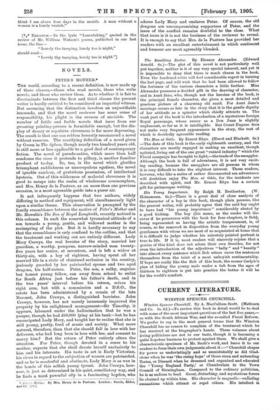PETERS MOTHER.*
THE world, according to a recent definition, is now made up of three classes,—those who read novels, those who write novels, and those who review them. As to whether it is fair to discriminate between the first and third classes the present writer is hardly entitled to be considered an impartial witness. But assuming that the distinction involves an unjustifiable innuendo, and that the novel reviewer has some sense of responsibility, his plight is the reverse of enviable. The number of futile and feeble novels that issue from our groaning printing-presses is formidable enough, but the dis- play of dreary or repulsive cleverness is far more depressing. The result is that one can seldom honestly recommend a novel without reserves. The scarifying definition of a novel given by Green in The Spleen, though nearly two hundred years old, is still more or less applicable to a good deal of contemporary fiction. The novel of pseudo-satire, which more than half condones the vices it pretends to pillory, is another familiar product of to-day. So, too, is the novel which glorifies triumphant caddishness or unscrupulous egotism, the novel of ignoble candour, of gratuitous pessimism, of intellectual hysteria. Out of this wilderness of malarial cleverness it is good to escape into the realm of wholesome commonplace, and Mrs. Henry de in Pasture, as on more than one previous occasion, is a most agreeable guide into a purer air.
It not infrequently happens that two authors, widely
differing in method and equipment, will simultaneously light upon a similar theme. This observation is prompted by the family resemblance between the motive of Peter's Mother and Mr. Howells's The Son of Royal Langbrith, recently noticed in this column. In each the somewhat tyrannical attitude of a son towards a young, gentle, and widowed mother is the mainspring of the plot. But it is hardly necessary to say that the resemblance is only confined to the outline, and that the treatment and working out are entirely different. Lady Mary Crewys, the real heroine of the story, married her guardian, a worthy, pompous, narrow-minded man twenty- five years her senior, at seventeen, and is left a widow at thirty-six, with a boy of eighteen, having spent all her married life in a state of cloistered seclusion in the country, jealously guarded by her patriarchal spouse and two aged dragons, his half-sisters. Peter, the son, a sulky, angular, but honest young fellow, ran away from school to enlist for South Africa just before his father's death, and in the two years' interval before his return, minus his right arm, but with a commission and a D.S.O., the estate has been administered by a cousin of the late Baronet, John Crewys, a distinguished barrister. John Crewys, however, has not merely immensely improved the property by his enlightened management—Sir Timothy, it appears, laboured under the hallucination that he was a pauper, though he had 260,000 lying at his bank—but he has emancipated Lady Mary, and taught her to realise that she is still young, pretty, fond of music and society. What more natural, therefore, than that she should fall in love with her deliverer, who had long been in love with her, and consent to many him P But the return of Peter entirely alters the situation. For Peter, though devoted in a sense to his mother, expects that she shall devote herself exclusively to him and his interests. His taste in art is Early Victorian, his views in regard to the subjection of women are patriarchal, and as he is masterful and obstinate, Lady Mary is as wax in the hands of this selfish young tyrant. John Crewys, how- ever, is just as determined in his quiet, conciliatory way, and he finds a most powerful ally in a fascinating hoyden, who • Petel'e Mother. By Mrs. Henry de la Pasture. London : Smith. Elder, and Co. L6s-1 adores Lady Mary and enslaves Peter. Of course, the old dragons are uncompromising supporters of Peter, and the issue of the conflict remains doubtful to the close. What that issue is it is not the business of the reviewer to reveal. It is enough to say that Mrs. de la. Pasture has provided her readers with an excellent entertainment in which sentiment and humour are most agreeably blended.






































 Previous page
Previous page